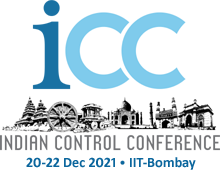A Tutorial on Internet of Things
Speakers: Rajbabu Velmurugan, Siddharth Tallur, Gaurav Kasbekar, Kumar Appaiah and Lohit Penubaku, Technology Innovations Hub – Internet of Things, IIT Bombay
Sessions: MoIAT1, MoIBT1, MoICT1
Abstract: Internet of Things (IoT) comprises several connected sensors and aims to effectively address several challenges in agriculture, health care, security and industrial operations. In a typical IoT system, sensors (IoT nodes) measure certain parameters, interface circuits perform signal conditioning and digitization, which are digitally processed and analyzed using machine learning algorithms. These then lead to certain control and actuation of devices. Standard networking protocols ensure seamless connectivity of IoT nodes and control of devices.
The objective of this tutorial is to provide a basic introduction to students and research scholars on developing an IoT based system, including the various components of such a system. It will cover aspects that need to be considered in design and implementation aspects of such a system. The lecture parts will cover systems level aspects of sensors, networks, and computing involved in IoT systems. There will be an associated demonstration/lab session that will walk-through of building such a system for a simple weather monitoring setup. This will include interfacing a basic IoT system to some sensors, the associated interfacing, communication, computation and analysis of data acquired through the IoT sensor setup. The lecture and lab sessions will be integrated to give a complete picture of a basic IoT system.
A priori identifiability of chemical, biochemical and biological networks
Speakers: Nirav Bhatt, and Sridharakumar Narasimhan, pCoE of Network Systems Control Learning, and Evolution, Indian Institute of Technology Madras.
Sessions: MoTBT2, TuTBT2, WeTBT2
Abstract: Study of (Bio-)chemical reaction networks is an interdisciplinary area of research involving understanding of chemical interactions in systems biology, chemical engineering, biotechnology, and chemistry. Models of reaction networks are important for fundamental understanding of molecular mechanisms, cell functionality in chemistry and biology. Models are also important for model-based process development and model-based control, optimization and monitoring during production in chemical and biotechnology industries. Hence, it is important to build informative kinetic models from experimental data for reaction networks. Advances in measurement techniques and process identification methods allow us to build high fidelity kinetic models for complex reaction networks. Identification of a unique and reliable dynamic model of the underlying system is a central theme in the field of system identification. Identification of reaction models is an iterative process involving (i) generating informative data and (ii) fitting a proposed model (or a set of proposed models) to generated data. The process is repeated until a model of acceptable fidelity is identified. Before we invest resources, time and experimental effort, it is important to answer the following question: “Does there exist a unique one-to-one map between the model and parameters being identified?” This question deals with a priori parameter identifiability of model identifiability. Identifiability analysis of reaction networks involves two related questions: the reaction rate identifiability and the structural rate identifiability. In this tutorial, we will introduce systematic approaches for determining a priori identifiability in complex and large-scale reaction networks from data.
Data-Driven Modelling and Fault Detection using Principal Component Analysis and its New Variants
Speakers: Arun K. Tangirala and Shankar Narasimhan, Dept. of Chemical Engineering, IIT Madras
Sessions: MoTAT1, MoTBT1, TuTAT1, TuTBT1, WeTAT1, WeTBT1
Abstract: Developing models from data, also known as system identification, is a powerful alternative to a first-principles approach. Classical system identification methods assume that the inputs are error-free. However, in many practical applications where data is collected, both the input and output observations can contain errors. System identification using such data is known as the errors-in-variables (EIV) identification. A powerful approach for developing EIV models, especially for multivariate processes, is based on the use of principal component analysis (PCA). Recently, important extensions such as iterative PCA (IPCA) and dynamic iterative PCA methods (DIPCA) have been proposed for identifying steady state and dynamic models, respectively. These comprehensive system identification methods estimate the system order, model coefficients, and error variances, supported by a strong theoretical basis. The focus of this workshop is to present the theory and tools for PCA-based approaches to EIV identification.
Foundations of Stochastic Approximation and Reinforcement Learning
Speakers: Gugan Thoppe and Shalabh Bhatnagar, Dept. of Computer Science and Automation, Indian Institute of Science
Sessions: MoTAT2, TuTAT2, WeTAT2
Abstract: Can a machine train itself in the same way an infant learns to sit up, crawl, and walk? That is, can a device interact with the environment and figure out the action sequence required to complete a given task? The study of algorithms that enable such decision-making is what the field of Reinforcement Learning (RL) is all about. In contrast, the mathematics needed to analyze such schemes is what forms the focus in Stochastic Approximation (SA) theory. More generally, SA refers to an iterative scheme that helps find zeroes or optimal points of a function, for which only noisy evaluations are possible. In this tutorial, we will provide a basic introduction of these two topics, both from an applied and a theoretical perspective. This session will be of significance to PhD students, postdocs, and junior faculty. We will presume familiarity of graduate level probability and optimization.
Reinforcement Learning for controls and robotics applications: Hands-on session in MATLAB and Simulink
Speakers: Pranav Lad and Akhil Gopinath, MathWorks India Private Limited
Sessions: MoIAT2, MoIBT2
Abstract: Reinforcement learning allows one to solve control problems using deep learning but without using labeled data. Instead, learning occurs through multiple simulations of the system of interest. This simulation data is used to train a policy represented by a deep neural network that would then replace a traditional controller or decision-making system. In this session, one will learn how to apply reinforcement learning using MATLAB and Simulink including how to set up environment models, define the policy structure, and scale training through parallel computing to improve performance. The workshop will help one to understand the reason how such an approach helps in solving control problems.

